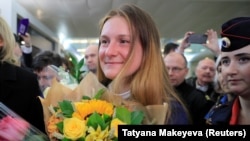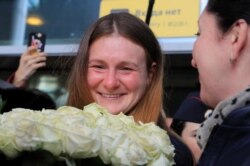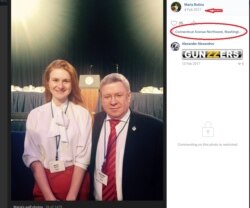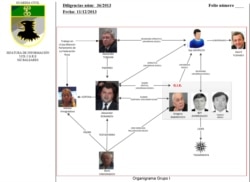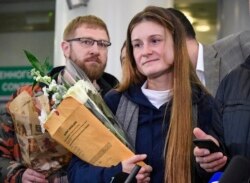Prior to her release on October 25 from a low-security prison in Tallahassee, Florida, where she served roughly 15 months of an 18-month sentence, Maria Butina gave an interview to 60 Minutes’ Lesley Stahl of the CBS network in the U.S.
Butina pled guilty in December to conspiracy to act in the U.S. as an agent of a foreign government, without filing as a foreign agent.
Russia’s TASS state news agency provided a selective account of that interview, focusing exclusively on prison conditions, which Butina characterized as “torture,” a claim that Polygraph.info previously investigated.
Butina told Stahl that Judge Tanya Chutkan was “absolutely wrong” in saying that Butina’s crime – working as an undeclared agent of the Russian government –presented a threat to democratic institutions in the United States.
Butina further claimed her prosecution was based on her nationality and not the merits of the case, saying if she had not been Russian, her efforts to cultivate ties with U.S. political groups and individuals – primarily conservative – “would have been called “social networking.”
"It’s all conspiracy theories. There is absolutely no proof of any of that, and I am not aware of any actions like this," Butina said, “rejecting,” according to TASS, “allegations that there were [sic] some ‘government person’ behind her.”
TASS’s rendering of this portion of the 60 Minutes interview is misleading.
First, TASS makes no mention of Alexander Torshin, whom Butina admitted had “directed” her activities as a foreign agent in the United States.
Torshin, who resigned as deputy governor of Russia’s Central Bank in November 2018 – one month prior to Butina’s guilty plea – was also a former Russian senator who has close ties to Russian President Vladimir Putin. According to Politico, a U.S. newspaper, FBI counterintelligence linked Torshin to a “U.S.-Russia exchange program” that the agency alleges “was an elaborate cover for a Washington-based Russian spy recruiting effort.”
Politico also reported that Torshin helped facilitate the so-called “Illegals Program” spy swap, in which 10 Russian operatives who had been living undercover in the U.S. for years (including “Anna Chapman”) were exchanged for four Russian citizens imprisoned by Russia on espionage charges.
In April 2018, the U.S. Treasury Department sanctioned Torshin for election interference, while Spanish investigators have linked him to Russian mafia activity.
CBS reported it obtained thousands of private Twitter messages between Butina and Torshin, which apparently caught Butina off guard.
One exchange went as follows:
Stahl: Was [Torshin] close to Putin?
Butina: I don't think so.
Stahl: So you wrote him a message and you said, "You are an influential member of [Putin's] team." Your words.
Butina: It doesn't suggest he's close to Putin in any way.
Stahl: But was he an influential member of Putin's team?
Butina: I don't know.
Stahl: Well, you wrote that. You know, in reading through your messages it reads as if he's -- your intelligence case officer.
Butina: Look, this is-- I think it's an American, very old saying that suggests that wolves have teeth, but not all animals with teeth are wolves. You cannot judge a person based on appearance.
Stahl did not merely allege some government person was behind Butina, as reported by TASS.
Stahl said “you can get the impression that there's some government person higher than Torshin kinda directing this whole thing, pulling the strings,” citing actions that implied “they needed to run the decision up to a more senior level.”
John Demers, the U.S. assistant attorney general for national security, in a CBS interview called Butina’s answers “a masterpiece of disinformation.”
“It had conflation, obfuscation, changing the subject, accusing you of being sexist, accusing the American people of being racist against Russians whenever the questions got difficult… trying to change the topic. Partial denials,” Demers told 60 Minutes.
As Stahl noted, upon being greeted with a “media frenzy” after returning to Moscow, Butina “immediately started giving interviews about the conditions of her incarceration.”
Likewise, the TASS article, titled “Butina says being in US prison was 'torture',” hit on many of those disinformation themes, while ignoring most of the evidence presented by Stahl and opting not to mention Torshin at all.
Polygraph.info thus finds TASS’s presentation of the Butina interview to be misleading.




